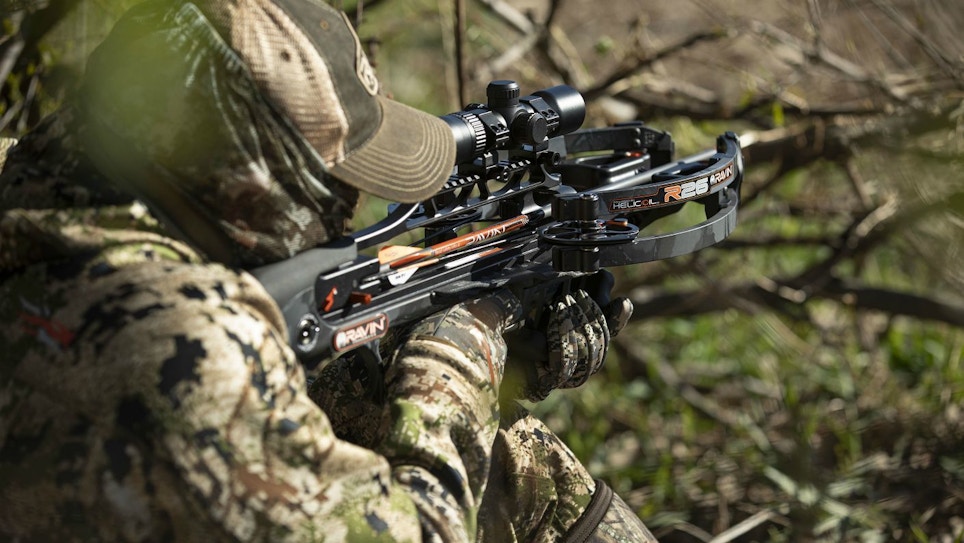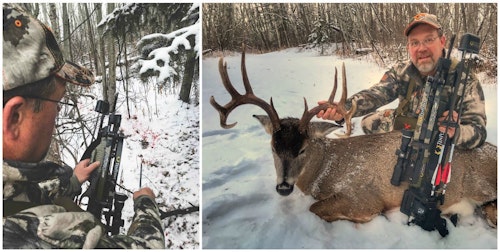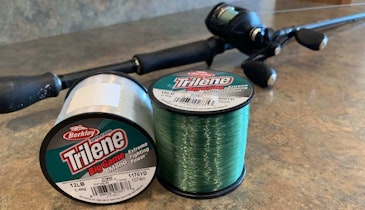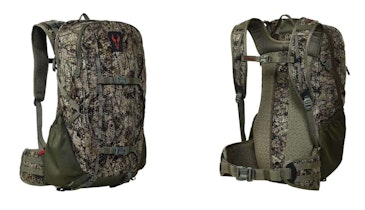Anyone with intimate knowledge of a crossbow will understand why it aligns closely with archery equipment and nowhere near a firearm. But there are still comparisons made that are misleading. Hunting with a crossbow, as with any other tool, requires practice to become efficient and consistent enough to shoot an animal and kill it cleanly. Knowing your equipment means developing personal ethics for what happens after the shot, or if a shot should even be considered.
One November afternoon provided the perfect weather for heading to a favorite treestand. With the current moon phase, the deer had been active during the daylight hours, and with any luck, the big buck roaming the neighborhood would slip up.
With senses on high alert, it did not take long to scurry down the trails and find the comfort zone in my stand. Deer filtered through, feeding on the shrubs and other forest groceries. An enjoyable day was quickly coming to an end, as the sun set below the western horizon. I was already busy scheming about how to spend more time in the stand when the crunch of hooves on snow turned my ears into radar dishes. Looking up, I saw my target buck for the season sauntering down the trail.
Keep High Standards
It was challenging to manage an increasing heart rate and keep from holding my breath at the sight of the tall antlers. Darkness was already descending in the trees to the point that shadows were no longer being cast. The buck would pass within crossbow range, but the fact I had to fly out early the next morning for work made me second guess the opportunity. As any archer knows, a big deer shot with a broadhead and arrow needs time to expire. Tracking at night is difficult, and a lack of time to look in the morning forced me to make the ethical decision not to shoot.
The deer wandered past the stand at 22 yards, stopping briefly. I closed my eyes, not wanting to see the deer or tempt me to change the decision already made. The walk home was emotional, with my mind questioning the decision to pass on the buck.
Nobody knew of the encounter, as I did not need other opinions questioning personal ethics. Every hunter needs to make decisions that are fair to the animals pursued, and to themselves. High standards are what separate ethical hunters from those with no respect for the game pursued.
Generate Positive Results
One month later, in December, I returned home from work early in the afternoon. A quick discussion with my better half provided the green light to sit in my stand again before the season came to an end.
The excitement was tantamount to opening day as I headed down the trail. Once in the stand, I pulled my crossbow up on a tether and cocked it before sliding an arrow into place down the rail. Preparing for an extended sit, the noise of a deer moving on the adjacent ridge swiveled my head. I had been in the stand only 20 minutes and expected to see a doe or fawn on the move. To my surprise, it was the target buck I had not seen in 30 days. The same rush of emotions I had experienced a month earlier overwhelmed me. However, this time I focused on the shot opportunity.
The big buck ambled down the same trail it had used in the past. The big 10-pointer passed in front of the stand at just over 20 yards but presented only a shot quartering toward me. When the buck was almost at 30 yards, the broadside window I had hoped for opened. A gentle, steady squeeze of the trigger sent an arrow through the buck in the blink of an eye. The deer jumped, took three steps, and crashed forward as it fell to the ground. I was able to watch the entire sequence and knew that no tracking would be necessary.
Of course, having the buck on the ground validated my choice to pass on him a month earlier. The deer is the largest I have taken with a crossbow, and the two hunts will forever be etched in my mind as positive memories arising from sound decisions.
Ethics can generate positive results, but they can also come at a cost. Hunting the late season in Missouri, the deer poured into food plots in ways I had never experienced. The parade of bucks and does was impressive, and I held out for a big boy. The last evening of the hunt, an extremely tall racked four-by-four buck stepped out of the woods, along with a respectable ten-point.
Make the Shot or Don’t
The bucks sparred and ate in intervals that slowly allowed them to work down the field. The shooting window of the blind was propped open, and the crossbow was steady on a shooting stick. In the last couple minutes of legal light, the bucks finally stood broadside in front of the blind. Once again, I was faced with an ethical dilemma to shoot or not. This time, there was no worry about follow up or tracking. The problem was the deer was at 61 yards, and it was dead calm and quiet. There was no doubt that the sound of the crossbow launching an arrow out of the box blind would cause the animal to jump the string. The second part of the thought process was that the deer was 10 yards farther than what I had set for hunting purposes to ensure a clean kill.
The deer was given a pass and potentially walked out of my life forever.
Three days later, I was able to return and hunt the same blind. Sitting comfortably, it did not take long to spot the target buck that showed up just after sunrise. The red coloration of its hide and a unique splotch on its shoulder were positive identifiers. The buck took its time but eventually fed within 20 yards of the blind, where it stood broadside. This time I did not lift my crossbow but tipped my hat at the old boy, as he had won the match fair and square.
During the three days I had been gone, the buck had dropped both antlers, giving him a free pass until next season. There are no regrets on passing on the long shot when it was available, and nobody knows what the final chapter will be in the story. With any luck, the buck will be even bigger next year, and the right opportunity will present itself for a shot.
Every hunter needs to develop a set of ethics. Regulations often force ethical decisions, but hunters are often faced with situations where the question will arise — do I shoot or not?







